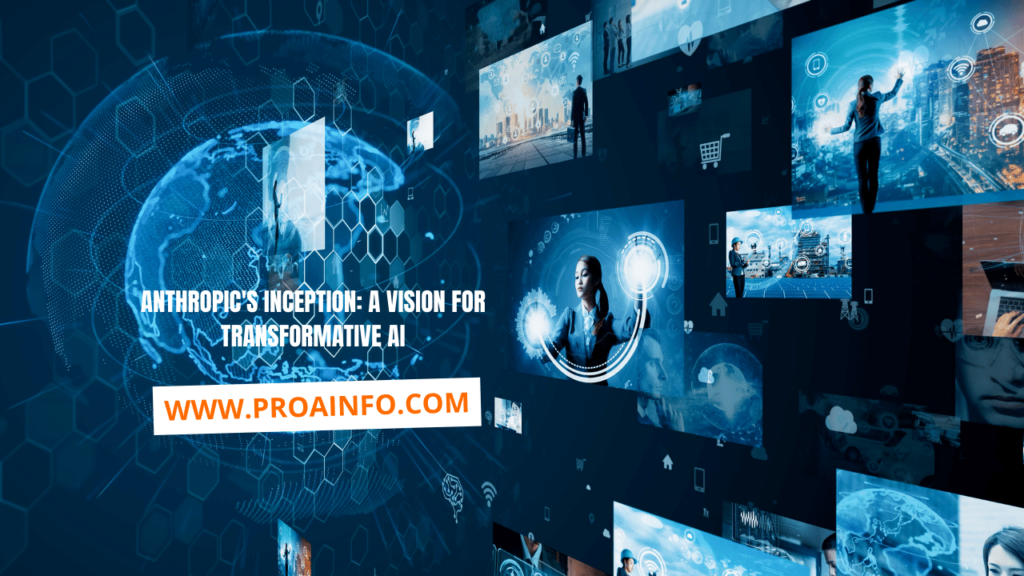Who developed Claude 3? In the rapidly evolving field of artificial intelligence (AI), a new player has emerged, making waves with its groundbreaking language model, Claude 3.
Anthropic, the company behind this remarkable achievement, has captivated the tech world with its innovative approach and commitment to developing safe and ethical AI systems. This comprehensive article delves into the origins of Anthropic, the visionaries behind the company, and the development process that led to the creation of Claude 3.
Anthropic’s Inception: A Vision for Transformative AI

The Birth of an Idea Anthropic’s story begins with a group of forward-thinking individuals who shared a deep passion for pushing the boundaries of AI technology. Among them were researchers, engineers, and entrepreneurs who had previously worked at prestigious institutions and tech giants, including OpenAI, Google, and the University of California, Berkeley.
These pioneers recognized the immense potential of AI but also the inherent risks and challenges that came with its rapid advancement. They believed that the development of AI systems should be guided by a strong ethical framework and a commitment to ensuring the technology’s positive impact on humanity.
The Founding Team In 2021, the founding team came together, united by their shared vision of creating transformative AI systems that could benefit society while mitigating potential risks. The core members included:
- Dario Amodei: A former research scientist at OpenAI, known for his groundbreaking work on AI safety and machine learning interpretability.
- Daniel Ziegler: An experienced entrepreneur and engineer who had previously co-founded and served as the CTO of a successful tech startup.
- Paul Christiano: A respected researcher in the field of AI alignment, focused on developing methods to ensure AI systems behave in accordance with human values.
- Jared Kaplan: A seasoned machine learning researcher with expertise in natural language processing and deep learning architectures.
With a diverse range of backgrounds and expertise, the founding team brought a wealth of knowledge and experience to the table, setting the stage for Anthropic’s ambitious endeavors.
Anthropic’s Mission and Principles From the outset, Anthropic’s mission was clear: to develop advanced AI systems that could positively impact humanity while adhering to stringent ethical principles. The company’s core values revolved around transparency, accountability, and a commitment to responsible AI development.
One of Anthropic’s guiding principles was the belief that AI systems should be imbued with a deep understanding of human values and ethics. This meant exploring novel approaches to instill AI models with a sense of right and wrong, enabling them to navigate complex ethical dilemmas and make decisions aligned with human well-being.
Furthermore, Anthropic embraced the concept of interpretability, emphasizing the importance of creating AI models that could explain their decision-making processes in a way that humans could understand. This transparency was seen as crucial for building trust and enabling effective collaboration between humans and AI systems.
Securing Funding and Building a Team With a clear vision and a strong founding team in place, Anthropic set out to secure the necessary funding to bring their ambitious plans to fruition. The company’s innovative approach and commitment to ethical AI development resonated with investors, and in 2021, Anthropic successfully raised $124 million in a Series A funding round led by renowned venture capital firms such as Dustin Moskovitz and Skype co-founder Janus Friis.
Armed with the financial resources, Anthropic began assembling a team of top talent from around the world. The company attracted researchers, engineers, and experts from diverse fields, including machine learning, natural language processing, ethics, and philosophy. This multidisciplinary team brought a wealth of perspectives and expertise, fostering an environment conducive to innovation and collaboration.
The Development of Claude 3
Laying the Groundwork: Research and Experimentation With a talented team and ample resources, Anthropic embarked on an extensive research and development journey to create a language model that would redefine the boundaries of AI capabilities. The company’s efforts were guided by a rigorous scientific approach, drawing upon the latest advancements in machine learning, natural language processing, and AI safety.
One of the key challenges Anthropic tackled was the issue of AI alignment – ensuring that the AI system’s goals and behaviors were aligned with human values and intentions. The researchers explored novel techniques, such as constitutional AI and debate, to instill the model with a deep understanding of ethics and the ability to engage in reasoned discourse.
Anthropic also invested significant resources into interpretability research, developing methods to make the inner workings of the language model more transparent and explainable. This was seen as a crucial step toward building trust and enabling effective collaboration between humans and AI systems.
Iterative Development and Testing The development of Claude 3 followed an iterative process, with the team continuously refining and testing the model through various stages. Each iteration involved training the language model on vast datasets, evaluating its performance, and making necessary adjustments to improve its capabilities and adherence to the company’s ethical principles.
Throughout this process, Anthropic employed rigorous testing methodologies, including adversarial testing and red teaming exercises. These techniques involved intentionally challenging the model with edge cases, ambiguous scenarios, and potentially harmful prompts, allowing the team to identify and address any vulnerabilities or undesirable behaviors.
Scaling Up and Optimizing Performance As the development progressed, Anthropic faced the challenge of scaling up the model’s architecture and training process to accommodate the vast amount of data and computational resources required. The company invested in state-of-the-art hardware and leveraged cutting-edge techniques in distributed training and optimization.
One of the key innovations was the development of efficient model parallelization strategies, which allowed the team to distribute the training process across multiple GPUs and servers, significantly accelerating the training time and enabling the model to be trained on larger datasets.
Anthropic also explored novel compression and pruning techniques to reduce the model’s memory footprint and computational requirements, making it more accessible and deployable across a wider range of hardware platforms.
Integrating Ethical Safeguards Throughout the development process, Anthropic remained steadfast in its commitment to ensuring the ethical and responsible deployment of Claude 3. The team implemented various safeguards and filtering mechanisms to mitigate potential risks and prevent the model from engaging in harmful or undesirable behaviors.
One of the key safeguards was the integration of content filtering systems, which scanned the model’s outputs for explicit or inappropriate content, hate speech, and other forms of harmful language. Additionally, Anthropic developed techniques to prevent the model from engaging in activities that could promote illegal or unethical actions, such as generating instructions for violence or hate crimes.
The team also explored methods to imbue the model with a strong sense of honesty and truthfulness, ensuring that it would not intentionally spread misinformation or engage in deceptive practices.
The Launch of Claude 3
After years of intensive research, development, and testing, Anthropic announced the launch of Claude 3 in August 2023. The unveiling of this groundbreaking language model was met with widespread anticipation and excitement within the tech community and beyond.
Unprecedented Capabilities Claude 3 boasted an impressive array of capabilities that set it apart from its predecessors. With its vast knowledge base spanning numerous domains, the model could engage in substantive conversations, provide in-depth analysis, and offer creative solutions to complex problems.
One of the standout features of Claude 3 was its ability to understand and respond to contextual cues and nuances, enabling more natural and human-like interactions. The model could interpret and generate text in various styles and tones, making it suitable for a wide range of applications, from creative writing to technical documentation.
Ethical and Transparent Decision-Making Perhaps the most notable aspect of Claude 3 was its adherence to the principles of ethical and transparent decision-making. Through Anthropic’s innovative techniques, the model demonstrated a deep understanding of human values, ethics, and social norms, enabling it to navigate complex ethical dilemmas and make decisions that prioritized human well-being.
Moreover, Claude 3 excelled in providing detailed explanations for its outputs, shedding light on the reasoning behind its decisions and recommendations. This level of transparency was unprecedented in language models and was seen as a crucial step toward building trust and fostering effective human-AI collaboration.
Initial Applications and Impact Following its launch, Claude 3 quickly gained traction across various industries and sectors. Anthropic partnered with organizations in fields such as healthcare, education, and scientific research, leveraging the model’s capabilities to tackle complex challenges and drive innovation.
In the healthcare domain, Claude 3 was employed to assist in medical research, analyze clinical data, and even provide personalized health advice to patients. The model’s ability to understand and communicate complex medical information in a clear and accessible manner proved invaluable.
Educational institutions embraced Claude 3 as a powerful tool for enhancing learning experiences and supporting personalized education. The model’s vast knowledge base and ability to engage in substantive discussions made it an ideal virtual tutor and research assistant.
Scientific communities also leveraged Claude 3’s capabilities for data analysis, hypothesis generation and literature review, accelerating the pace of scientific discovery and innovation.
Beyond these specialized applications, Claude 3 also found its way into various consumer-facing products and services. Tech companies integrated the model into virtual assistants, chatbots, and content creation tools, enabling more natural and intelligent interactions with users.
The impact of Claude 3 extended far beyond its immediate applications. Its success served as a testament to Anthropic’s unwavering commitment to developing safe and ethical AI systems. The company’s approach inspired other organizations and researchers to prioritize AI safety and interpretability, shaping the trajectory of the field and setting new standards for responsible AI development.
Challenges and Ongoing Efforts

Despite the remarkable achievements of Claude 3, Anthropic and the broader AI community recognize that the journey towards safe and beneficial AI is an ongoing endeavor. As with any groundbreaking technology, the development and deployment of Claude 3 presented a set of challenges that required careful navigation.
Addressing Bias and Fairness Concerns One of the key challenges faced by Anthropic was ensuring that Claude 3 was free from harmful biases and discriminatory tendencies. Language models, by nature, can inherit biases present in the data they are trained on, leading to potentially unfair or discriminatory outputs.
Anthropic employed various debiasing techniques and rigorous testing methodologies to identify and mitigate these biases. However, the company acknowledges that achieving true fairness and inclusivity in AI systems is an ongoing challenge that requires continuous effort and refinement.
Scaling and Democratizing Access As the demand for Claude 3’s capabilities grew, Anthropic faced the challenge of scaling its infrastructure and computing resources to meet the increasing demand. The company explored innovative techniques in distributed training, model compression, and efficient deployment strategies to ensure that the model could be accessible to a wider range of users and organizations.
Additionally, Anthropic recognized the importance of democratizing access to advanced AI technologies like Claude 3. The company partnered with educational institutions, non-profit organizations, and research communities to provide access to the model, fostering innovation and enabling a broader range of stakeholders to benefit from its capabilities.
Navigating Regulatory Landscapes The rapid advancement of AI technologies has also highlighted the need for clear and effective regulatory frameworks to ensure their responsible development and deployment. Anthropic actively engaged with policymakers, industry consortiums, and ethical advisory boards to contribute to the ongoing discussions around AI governance and regulation.
The company advocated for the adoption of principles such as transparency, accountability, and human oversight, striving to strike a balance between promoting innovation and safeguarding against potential risks and unintended consequences.
Continuous Improvement and Future Developments Despite the remarkable achievements of Claude 3, Anthropic remains committed to ongoing research and development efforts to further advance the capabilities and safety of its AI systems. The company recognizes that the field of AI is constantly evolving, and the challenges and opportunities of tomorrow may be vastly different from those of today.
Anthropic’s researchers continue to explore novel techniques in areas such as multi-modal AI, combining language models with visual and other sensory inputs, to enable more versatile and intelligent systems. Additionally, the company is investing in advanced reasoning and decision-making capabilities, aiming to create AI systems that can tackle complex, real-world problems with human-like reasoning and judgment.
Furthermore, Anthropic is committed to advancing the field of AI alignment and interpretability, recognizing that these factors are crucial for ensuring the safe and beneficial development of increasingly capable AI systems. The company’s ongoing efforts in this domain aim to pave the way for a future where humans and AI can collaborate seamlessly, fostering innovation and progress while safeguarding against potential risks.
Conclusion
The development of Claude 3 by Anthropic represents a significant milestone in the field of artificial intelligence. Through their unwavering commitment to ethical and responsible AI development, the visionary team at Anthropic has demonstrated that it is possible to create highly capable AI systems while prioritizing human values, transparency, and accountability.
Claude 3’s unprecedented capabilities, coupled with its adherence to ethical principles and its ability to provide transparent decision-making, have set a new standard for the AI industry. The model’s impact has been felt across various sectors, from healthcare and education to scientific research and consumer applications, showcasing the transformative potential of AI when developed with a responsible and human-centered approach.
While the challenges associated with AI development are complex and multifaceted, Anthropic’s journey with Claude 3 has inspired a broader dialogue around the importance of AI safety, fairness, and interpretability. The company’s efforts have catalyzed a shift in the industry, encouraging other organizations and researchers to prioritize these critical aspects in their own AI endeavors.
As the field of artificial intelligence continues to evolve at a rapid pace, Anthropic remains at the forefront, committed to pushing the boundaries of what is possible while upholding the highest ethical standards. The company’s ongoing research and development efforts, coupled with its collaborative approach and engagement with policymakers and stakeholders, position it as a driving force in shaping the responsible and beneficial development of AI for generations to come.
The story of Claude 3 is not just a tale of technological innovation; it is a testament to the power of human ingenuity, vision, and unwavering commitment to creating a better future for all. As we navigate the uncharted territories of AI, the lessons learned from Anthropic’s journey will serve as a guiding light, inspiring us to embrace the transformative potential of this technology while ensuring that it remains aligned with our shared values and aspirations.
FAQs
What is Claude 3?
Claude 3 is a state-of-the-art language model developed by Anthropic, a pioneering AI research company. It is designed to engage in natural language interactions, provide in-depth analysis, and offer creative solutions to complex problems while adhering to ethical principles and prioritizing human well-being.
What makes Claude 3 unique?
Claude 3 stands out for its exceptional capabilities in natural language understanding and generation, coupled with its strong emphasis on ethical decision-making and transparent reasoning. The model has been imbued with a deep understanding of human values and ethics, enabling it to navigate complex ethical dilemmas and make decisions aligned with human well-being. Additionally, Claude 3 excels in providing detailed explanations for its outputs, shedding light on its decision-making processes.
How does Claude 3 ensure ethical decision-making?
Anthropic employed various techniques to instill Claude 3 with a strong sense of ethics and moral reasoning. This included training the model on ethical frameworks, implementing safeguards to prevent harmful or undesirable behaviors, and integrating filtering mechanisms to mitigate biases and discriminatory tendencies.
What applications is Claude 3 used for?
Claude 3 has found applications across various domains, including healthcare, education, scientific research, and consumer-facing products and services. It has been employed for tasks such as medical research, personalized health advice, virtual tutoring, data analysis, content creation, and intelligent virtual assistants.
How is Anthropic addressing concerns around AI bias and fairness?
Anthropic recognizes the importance of addressing potential biases and discriminatory tendencies in AI systems. The company employs debiasing techniques and rigorous testing methodologies to identify and mitigate biases in Claude 3. However, they acknowledge that achieving true fairness and inclusivity in AI is an ongoing challenge that requires continuous effort and refinement.
What efforts is Anthropic making to ensure responsible AI development?
Anthropic actively engages with policymakers, industry consortiums, and ethical advisory boards to contribute to discussions around AI governance and regulation. The company advocates for principles such as transparency, accountability, and human oversight, striving to strike a balance between promoting innovation and safeguarding against potential risks and unintended consequences.
What are Anthropic’s future plans for AI development?
Anthropic remains committed to ongoing research and development efforts to further advance the capabilities and safety of its AI systems. The company is exploring novel techniques in areas such as multi-modal AI, advanced reasoning and decision-making capabilities, and continuing to advance the field of AI alignment and interpretability.
How can individuals or organizations access Claude 3?
Anthropic has partnered with various organizations and research communities to provide access to Claude 3. Interested parties can explore opportunities for collaboration or licensing arrangements by contacting Anthropic directly.
What is Anthropic’s vision for the future of AI?
Anthropic’s vision is to shape a future where advanced AI systems like Claude 3 can collaborate seamlessly with humans, fostering innovation and progress while safeguarding against potential risks. The company aims to set new standards for responsible and beneficial AI development, inspiring others to prioritize ethical considerations and paving the way for a future where AI technology is aligned with human values and well-being.







